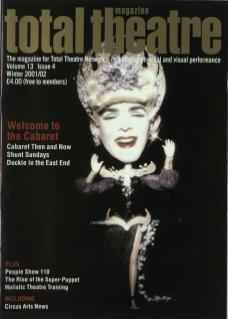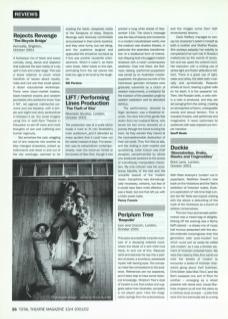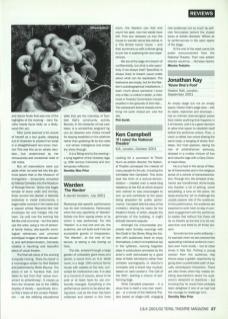With Peter Ackroyd's London out in paperback, Matthew Sweet's new book on the Victorians and the Tate's exhibition of Victorian nudes, Duckie's exploration of ‘old-time East London low life' feels very topical – sharing with the above a debunking of the myth of the Victorians as a bunch of sexless conservatives.
This two-hour promenade performance was a mixed bag of delights. Kicking off the evening was a Penny Gaff cabaret – a cheery mix of music hall humour presented with the double-entendre knowingness that this generation calls 'post-modern' but which could just as easily be called ‘pre-modern' as it was a familiar element of Victorian entertainment. We were then lead by Miss Amy Lamé out onto the streets of London to encounter a series of Victorian characters going about their business. Chris Green (aka Miss Tina C and Ida Barr) swapped one sort of frock for another – emerging as a street preacher with street cred. Ursula Martinez cropped up all over the place as a cockney poop-a-scooper – a joke that wore thin but eventually led to a song and dance finale that was one of the highlights of the evening – John Travolta meets Gene Kelly on a Bollywood film set.
Miss Lamé seemed a bit unsure of herself as a tour guide, stepping out of character to present her script in a straightforward non-ironic manner. This was fine as an artistic decision, but undermined by her nervousness and occasional need of crib notes.
But all reservations were put aside when we were led into the glorious space that is the Museum of Immigration – temporarily converted by Marisa Carnesky into the Museum of Strange Women. Within this fragile temple of stone walls and shrines, three women are placed: a tailoress bedecked in metal instruments, a bagel-seller covered in her wares, and a weaver whose Rapunzel-like hair envelops her and merges into her loom. Up until now the evening has felt like a bit of a romp – but this piece ups the ante; using a mix of personal family history, site-specific sociological references and universal archetypal images of female sexuality and self-determination, Carnesky creates a haunting and beautiful piece of visual theatre.
The final set-piece of the evening is equally moving. 'Does You Good' is a monologue written by Neil Bartlett and performed by Bette Bourne. The piece is set in Toynbee Hall, and takes its text from that 'active monument to philanthropy’. It moves us from the Victorian era to the 1960s heyday of Variety – specifically Johnny Ray's tears at the London Palladium – via the edifying educational talks that are the mainstay of Toynbee Hall's community activity. Bourne, in his character of hall caretaker, is a wonderfully poignant figure; an observer who chides himself for staying swaddled on the sidelines rather than grabbing life by the collar – but whose intelligence and empathy shine through.
It is a fitting end to the evening – a tying together of the Victorian legacy, 20th century memories and contemporary reflection.


